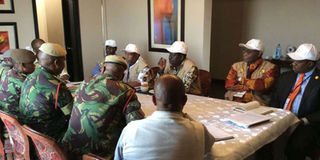Lesotho, a land gripped by culture of violence

This photograph dated March 1, 2016 shows Raila Odinga (background, third from left), the head of the African Union Election Observation Mission, with a team of African Union election observers in a meeting with leadership of the Lesotho Defence Force in Maseru on March 1, 2015. PHOTO | COURTESY
What you need to know:
Home to two million people, the stunning Lesotho, a nation state built by the venerated King Moshoeshoe I in the 1800s, has in abundance tricky slopes and countless green mountains that turn white in winter, thanks to the snow, with temperatures plunging way below zero.
But that serenity and natural beauty belie tension and bloody reality that have turned the Mountain Kingdom into a tragedy for a few years now.
Home to two million people, the stunning Lesotho, a nation state built by the venerated King Moshoeshoe I in the 1800s, has in abundance tricky slopes and countless green mountains that turn white in winter, thanks to the snow, with temperatures plunging way below zero.
But, that serenity and natural beauty belie tension and bloody reality that have turned the Mountain Kingdom into a tragedy for a few years now.
A new government came in via a snap election last March, following the previous year’s attempted coup d’état. Since then, chaos has worsened.
The country remains in the throes of instability even as it inches closer to its 50th independence jamboree on October 4.
For one, opposition leaders are still in exile. They explained at the Southern African Development Community (Sadc) summit in Mbabane, the Swaziland capital, on September 2 how their safety concerns remained legitimate.
Hardly a week earlier, three armed public servants stormed Thahakhube FM studios during a live current affairs show. One of them ended up grabbing the microphone.
‘POLARISING COMMUNITIES’
On the other hand, the Christian Council of Lesotho noted in a statement that “fear of violence is paralysing and polarising communities”.
Public opinion is that the military is above the law. How else would one explain kidnappings, by uniformed soldiers, or the murders carried out by some of them who in turn practically get away with it?
An unprecedented low came in February, with the shooting spree at Qeme, a village near Maseru, that left four dead and many others wounded.
All the Qeme victims belonged to the opposition party, whose leader is notably in exile.
The situation is worsening. “Crime statistics vary year to year starting from 2013 to 2016, and we face far higher rates of murder,” read the council of churches’ statement.
“Our social fabric, as Basotho who have been known by a culture of peace, is being torn apart by a culture of violence that leaves people dead and families afraid in our homes.”
That is why sections of the society, including some in the academia and in the civil movement prefer not to discuss the topic openly these days. It’s no wonder then the exiled leaders – including former Prime Minister Tom Thabane are refusing to come home.
PRIME MINISTER
It is almost 20 months since now-ruling coalition returned Pakalitha Mosisili as prime minister, who formerly spent 14 years in the same capacity (until 2012). Gunmen abounded in 2015, the year of snap elections, even as the regional Sadc kept watch. In 2016, political opponents were still never too far from bullets. The frequency was notches higher though as soldiers seemed to emulate a bloody era gone by – a period BM Khaketla narrates in Lesotho 1970 – when Fred Roach, formerly a Scotland Yard detective, enabled an illegitimate clique to seize power while he headed then-deadly Lesotho’s paramilitary force.
Today, Lt-Gen Tlali Kamoli, arguably the country’s most-feared man, is in charge of the Lesotho Defence Force (LDF). History rhymes eerily in these climes.
“The general discontent of some Basotho with the commander... and the conduct of the [army] under his command is disconcerting. In the interest of restoring trust and acceptance of the LDF to the Basotho nation, it is strongly recommended that [Kamoli] be relieved of his duties... and all LDF officers implicated in cases of murder, attempted murder and treason be suspended,” found a Sadc commission of inquiry in February.
Pity, the Mosisili-led coalition government disregarded the report and continued as if it were business as usual amid killings. Why?




